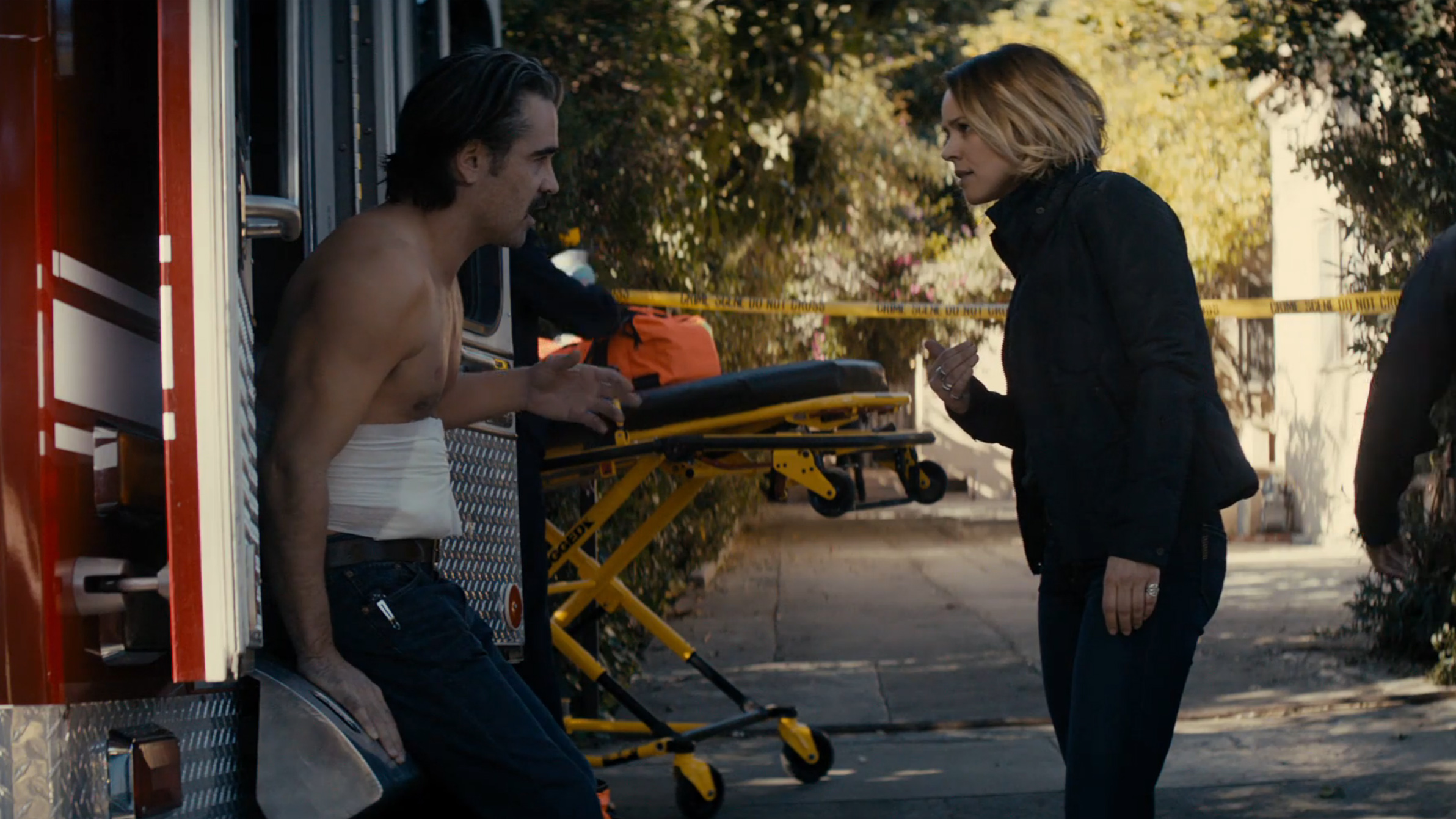Turns out it was rubber buckshot. “Like cops use,” as Velcoro says. Colin Farrell’s character has been half dead for the first two episodes of this season of True Detective, the locomotion of his present life permanently stunted by the decision he made years before to have his wife’s attacker killed. And while he’s not dead yet—there’s a faint glint of justice in his eyes that you can see as he’s being batted around by Frank Semyon and his bosses at Vinci PD—it may only be because he’s never truly considered the question posed to him by the police doctor who patches him up: does he want to live?
Whether we want him—or anyone—to live or not is another story. We’re through three episodes now, and it’s still hard to have much sympathy for any of these characters. Nic Pizzolatto has given Taylor Kitsch the kind of storyline that should have us rooting for him—closeted gay veteran returns from the war and is unable to assimilate who he was in wartime into the fullness of his identity. But Pizzolatto’s writing keeps Kitsch’s Woodrugh buttoned up in the extreme; Kitsch’s struggle to play it cool in the presence of so many prostitutes near the episode’s end is supposed to make him come across as repressed, but his scowling and fidgeting and doubles-ordering is overbearing, and it kills whatever goodwill he earns saying “Dude, chill” to his former lover at the dirt-bike track. (That moment is the first time we see Woodrugh transcend his angst, and even if it comes at the expense of him denying his partner and himself, it’s weirdly refreshing to see him express some kind of will.)
Meanwhile, we get flashes of what made Frank Semyon the crime boss of Southern California. His visit to the site manager and later impromptu dental work (“What kind of way is that to greet the world?”) explain how the brooding, ashen Semyon could ever have clawed his way to the top, while simultaneously suggesting that the collapse of the rail deal has loosened his footing as he attempts to climb into the legitimate world. “It’s just too big to walk away from,” he tells Agranov as he stares through the casino window at the wife who has just accused him of using her as his incubator. He’s not just talking about the land deal, but the entire crooked world that hangs over his ideal life like a sickle.
Still, it’s hard not to feel like Pizzolatto is holding us at arm’s length. Not to belabor the comparisons, but season one’s carrot was the case itself and the web of corruption that its solving promised to untangle. We’re not much closer to understanding why Caspere was killed, but we’re also not much closer to caring why Caspere was killed. The investigation gives us the chance to meet Mayor Chessani’s vaporizing wife and greek-underpant-wearing son, whose respective despair is at least colored differently from that of the detectives and Semyon, but it’s still difficult to get a grip on the stakes of solving the crime for all involved. Woodrugh just wants to get back on his bike so he can continue his solitary ride up the edge of the continent, while Semyon certainly doesn’t need legitimate justice to justify any of his decisions. Ani, meanwhile, is still all business, sidestepping the obvious questions about Woodrugh and the actress (“I was gonna ask if you thought the exposure would interfere with doing field work”). And Velcoro? Unless he can spin his findings to implicate someone higher up, he’ll have State investigators on his back no matter what he does.
“It’s about two tons of shit. Some collapse of civilization revenge flick.” That’s how the set photographer describes the film Velcoro and Ani are investigating. In 2015, the apocalyptic has lost its power to inspire. We expect the world, from its institutions to its individuals, to fail. The question of whether that makes us smarter and more honest than our predecessors hasn’t been answered as definitively as we might think. But the ubiquitous despair that we’ve wrought has—at the very least—damaged our ability to tell good stories; without any concept of the good, or, what’s more, any belief that goodness might prevail for any period of time no matter how short, darkness has no stakes. It’s hard to care about the death of a world that was never breathing to begin with. True Detective seems to know this—it’s “revenge” that’s connected to the end of the world here, and season two is nothing if not vengeful. Whether Pizzolatto is able to kick against the pricks without losing his edge remains to be seen. FL







